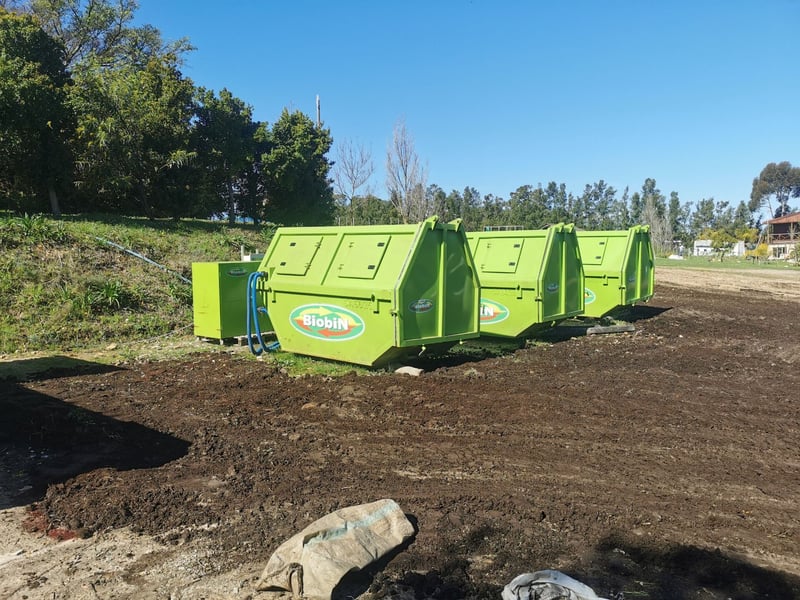Food waste increases by 25% over festive season
Written by: BiobiN South Africa (Pty) Ltd Save to Instapaper
While many of us start to put our daily stresses aside, the waste management sector experiences a significant increase in food and organic waste during the festive season. This places an increase amount of pressure on the waste sector, including the waste collection services, landfill sites and the natural environment. According to waste statistics, South Africa produces 25% more food and organic waste during the festive season, compared to other months.
“Small waste-wise habits that we can all implement will go a long way in keeping the volumes of organic waste going to landfill under control,” says Brian Küsel, from BiobiN South Africa. “While our consumption patterns are likely not to change during festive season, it is easier to implement good waste management practices that can divert food and organic waste from landfill.”
BiobiN South Africa shares three top tips that consumers can follow to reduce their food and organic waste footprint:
Separate your waste types at home.
The most important thing consumers can do is to separate their waste into recyclables, organic waste and landfill waste. Separating waste allows the management and processing of individual waste streams easier. When recyclables are dirty and mixed with organic waste, it decreases the value of the recyclables and recyclers will need to use a significant amount of water to wash dirty recyclable waste. Many recyclers will also not accept recycling that is mixed and dirty.
When food and organic waste is separated, it can be easily composted. Home composting systems are a great way to supplement your garden with a valuable soil resource. Composting on a larger scale has now become a lot more feasible with composting technology that has advanced significantly.
Support the businesses that compost.
Many consumers are basing their purchasing habits on the retail outlets that offer the most environmentally friendly or sustainable packaging options. While recyclability should remain a determinant in your product buying choices, supporting the retail outlets that divert their food waste from landfill or compost on-site is a step further, and which is also crucial to achieve a sustainable waste management and retail sector. Shopping centres and restaurants generate a lot of food and organic waste which present the biggest opportunity to repurpose this waste stream. This not only takes pressure off waste infrastructure, it also support the local organic waste economy with the emergence of new small-scale composting businesses.
Donate excess food to charities and food distribution programmes.
Along with better waste management in your home and better purchasing habits, donating excess food is both socially and environmentally responsible. Many of us will be left with excess food that is not used or eaten. This should be donated to your local charities and food drive. These organisations do not close during the festive season and always require support.
To find out more about this BiobiN South Africa, visit www.biobin.co.za
Get new press articles by email
With a decade of experience in communication and reputation management, I have carefully honed my hospitality, lifestyle, and advertising skills. My experience in translating business objectives into tactical multi-platform communication campaigns covers international brands and start-ups, world-class cycling events such as the Cape Town Cycle Tour (6 years), and luxury hotels, including the... Read More
Latest from
- Bring a Touch of Luxury to Your Table with Rhodes Quality’s New Premium Extra Fruit Jams
- The Ultimate Christmas Gift - Helios Smokeless Fire Pit Kits Bring the Heat Without the Smoke
- Quality Meets Convenience - Frozen For You Join Mr D
- AI-powered agency offers marketers a measurable return on insight
- Rhodes Quality Launches Limited Edition 100% Juices - A Refreshing Boost for the Day
- Why South Africans Are Looking at Smokeless Fire Pits This Heritage Month
- Brewed to Perfection - Nespresso Now at Your Doorstep with Mr D Premium Coffee, Instant Convenience at In-Store Pricing
- Owning the Flame - How Women Are Redefining Fire Culture
- When Love Means Letting Go or A Vet’s Story of Saying Goodbye
- Redefining Winter Braais - A New Era of Outdoor Living
- Two Icons, One Screen Mr D Joins the Legendary Vetkoekpaleis in Season 3
- I Say ‘Klippies’, You Say…?
- Winter Warmers - Best Fire Pits for South Africa’s Chilly Season
- Restaurant Week at Morii - A Feast for the Sense
- Put Your Crown On Ice
The Pulse Latest Articles
- Opinion Piece: Activating Leadership To Engage The Passive Workforce (February 11, 2026)
- Tchagra Trail Wilderness Consulting Launches A New Safari Experience In Photography And Tracking (February 9, 2026)
- Magic: The Gathering Releases Lorwyn Eclipsed (February 6, 2026)
- Back To Work, Back To Balance: Rethinking The 3pm Slump (February 5, 2026)
- Back-to-school Lunchboxes That Just Make Sense (February 5, 2026)
